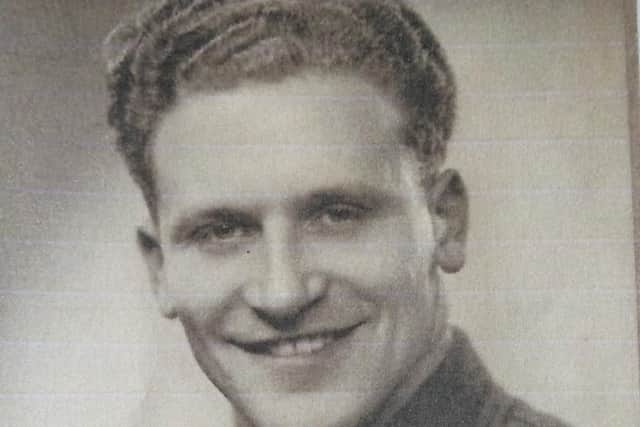Airman’s miraculous WWII survival was aided by unlikely Edinburgh connection
and live on Freeview channel 276
A family is paying tribute this week to a heroic Second World War airman who was aided in his miraculous survival 75 years ago by an astonishing Edinburgh connection.
Flight Sergeant John Hughes was one of just three of his crew to survive when their Lancaster bomber was shot down after a mission to the German city of Harburg in March 1945. The young RAF navigator escaped by parachute, landing near the town of Basdahl. John sustained serious injuries and was sent to the hospital at Sandbostel POW camp.
Advertisement
Hide AdAdvertisement
Hide Ad

Around ten weeks later, on April 29, 1945, the camp was liberated by the British and Hughes was saved along with thousands of others.
The badly-wounded Edinburgh airman was able to return home to his eventual wife with whom he would share the joy of welcoming six children into the world.
Capital-based writer Clare Cavanagh, one of Hughes’s sixteen grandchildren, said she is immensely proud of her granddad’s tale of wartime survival.
“The story of my granddad’s recovery is very precious to my family,” Clare, 35, explained.
Advertisement
Hide AdAdvertisement
Hide Ad“He died when I was five, but my only memories from that age are of him. He was my favourite person.”
Flight Sergeant Hughes’ recovery was exceptional. Having suffered a broken pelvis and a fractured spine due to his near-death ordeal in the skies above Basdahl, he would, among other athletic pursuits, go on to become heavyweight champion of Uganda after he and his wife moved to the East African nation to teach children in 1955.
But if not for a staggering quirk of fate, John’s story could have ended years earlier in Nazi Germany.
After John’s narrow escape from his stricken bomber, a farmer took him to the local constabulary in Basdahl.
Advertisement
Hide AdAdvertisement
Hide AdDuring interrogation that police officer, Herr Klinow, discovered he shared a personal link with the captured British airman.
It transpired that Klinow had been a prisoner-of-war himself 30 years earlier in the First World War and held at Edinburgh Castle in John’s hometown.
John’s eldest son, also John Hughes, 74, believes this incredible coincidence ensured his father’s safety.
“The policeman could have left him in the field, handed him over to the authorities or shot him,” John told the Evening News.
Advertisement
Hide AdAdvertisement
Hide AdOn Wednesday the family had hoped to attend a commemorative service in Germany to mark the 75th anniversary of Sandbostel’s liberation. However, the coronavirus lockdown saw the plans scrapped.
John Hughes says young people today should look for inspiration from his father’s generation and their ability to cope through hardship.
He added: “If my father was here today, he’d say ‘just sit back, let’s respect each other, get through it and think about what we do better’ – opportunity in adversity.”
A message from the Editor:
Thank you for reading this story on our website. While I have your attention, I also have an important request to make of you. With the coronavirus lockdown having a major impact on many of our advertisers - and consequently the revenue we receive - we are more reliant than ever on you taking out a digital subscription. Subscribe to scotsman.com and enjoy unlimited access to Scottish news and information online and on our app. With a digital subscription, you can read more than 5 articles, see fewer ads, enjoy faster load times, and get access to exclusive newsletters and content. Visit https://www.scotsman.com/subscriptions now to sign up. Our journalism costs money and we rely on advertising, print and digital revenues to help to support them. By supporting us, we are able to support you in providing trusted, fact-checked content for this website.
Joy Yates
Editorial Director